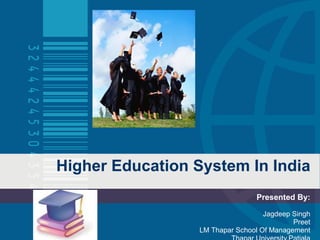Higher Education System In India
- 1. Higher Education System In India Presented By: Jagdeep Singh Preet LM Thapar School Of Management Thapar University,Patiala
- 2. Current Scenario India is the Third largest Economy by 2050. Government established UGC and AICTE. Primary role of AICTE and UGC has been to regulate the standard and spread quality higher education . Public seector expenditure on higher education has been declining. Gross Enrolment ratio in higher education in India is a low 12%,compared to nearly 70% in developed nations and 33% in BRIC countries.
- 3. Statistics In HRD Ministry Annual Report 2008-09 Universities in India:471(268 state Univ,40 Central Univ and 125 Deemed Univ) No. of Colleges:22,064 No. of students enrolled in the Year 2008-09: 12.37 million Average student faculty ratio in India is 26:1,against a global average of 15:1 Over 57 % faculty members donot have Phd s and M.Phils degrees
- 4. Major Issues and Concerns Over centralization: Lack of Institutional autonomy and accountability. Regulatory systems fails to maintain standards despite entry barriers for new Institutions Poor standards of academic Research To retain the best faculty in colleges Corporate salaries
- 5. Major Issues and Concerns Susrreptition:Private colleges to be profit making organisation Derecognitation of deemed universities Chaotic and unplanned expansion Mismatch in Education curriculum and industry needs .
- 7. E-learning/Online Tutoring understand the nerve of industries by inculcating the vocational as well as the soft skills Faculty should adopt new methodologies through internet Instead of routine lecture with presentations, workshops, seminars, experts lecture series , experiments and current analysis of the curriculum should be adopted.
- 8. FDI in Higher Education More opportunities to study for Indian students Brain Drain problem will reduce Ensure world class research facilities for Students Increase the employability in MNCŌĆÖs Interaction with some of top of the professors of world. To have world class labs and libraries Competitive advantage to become a Worlds largest hub for education.
- 9. Corporate Visibility Some institutes donŌĆÖt have the basic infrastructure Produce mere graduates rather than True proffesionals Curriculum Reforms Faculty development Expert Lectures Industry Networking
- 10. ╠²









